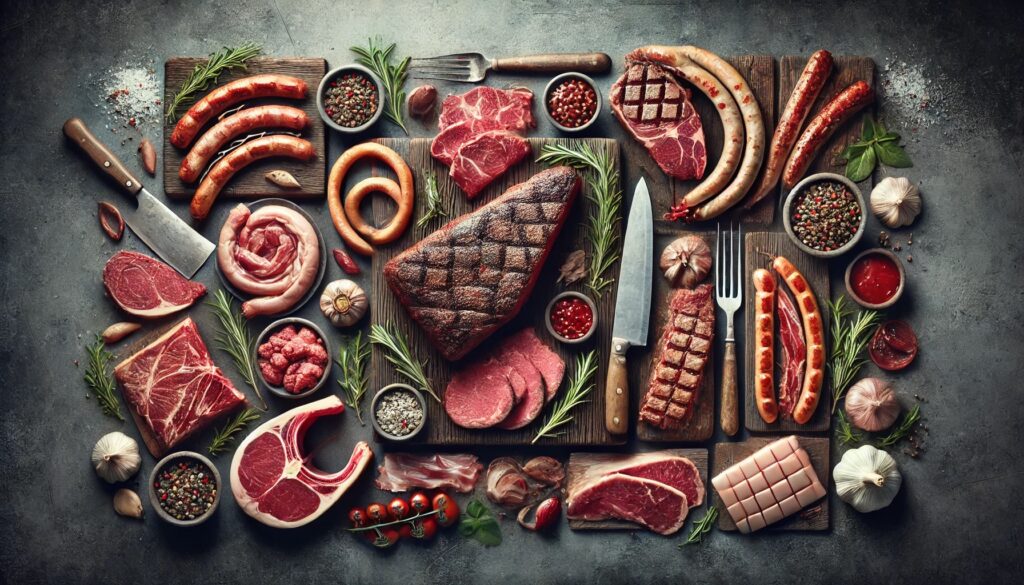Carnivore Diet 101: The Ultimate Beginner’s Guide

The carnivore diet is quickly gaining popularity for its simplicity and effectiveness. It’s exactly what it sounds like: a diet where you eat only animal-based foods. While it might sound extreme at first, many people have seen dramatic improvements in their health by eliminating plant-based foods and focusing on meat, eggs, and animal fats.
In this guide, we’ll cover everything you need to know to get started on the carnivore diet. Whether you’re curious about its health benefits, wondering about the science behind it, or are concerned about cholesterol, this guide is designed to help beginners understand the carnivore lifestyle.
What is the Carnivore Diet?
The carnivore diet is an all-animal product eating plan. Essentially, it’s a zero-carb diet where you consume meats, fish, eggs, and some dairy (depending on how strict you want to be). Unlike keto or paleo, which include low-carb vegetables and nuts, carnivore eliminates all plant foods.
Basic Principles of the Carnivore Diet:
- No plant-based foods: Fruits, vegetables, nuts, seeds, grains, and legumes are excluded.
- Animal-based foods only: This includes beef, pork, chicken, fish, eggs, and some dairy like butter and cheese.
- Focus on fatty cuts of meat: Fat is crucial for energy in a zero-carb diet.
Benefits of the Carnivore Diet
There’s growing anecdotal evidence that the carnivore diet can lead to significant health benefits, though more research is needed for large-scale clinical conclusions. Here are some commonly reported benefits:
- Weight Loss: Many people report rapid fat loss due to the diet’s simplicity and satiating nature. Animal foods are dense in nutrients and help you feel full longer.
- Improved Digestion: Cutting out plant foods, especially fiber, can relieve conditions like irritable bowel syndrome (IBS) and bloating.
- Mental Clarity: A diet rich in fats and protein can help stabilize blood sugar and improve cognitive function.
- Reduced Inflammation: Many chronic conditions tied to inflammation, such as arthritis or autoimmune disorders, may improve on a carnivore diet.
How to Get Started
Getting started on the carnivore diet is easier than it might seem. Here’s a simple guide to transitioning:
Step 1: Remove Plant Foods
This is the biggest shift. Begin by eliminating fruits, vegetables, grains, and any plant-based oils like olive or avocado oil. You’ll want to replace these with animal fats such as butter, tallow, or ghee.
Step 2: Focus on Fatty Meats
The carnivore diet relies on fat as the primary source of energy. Choose fatty cuts of meat like ribeye, ground beef, pork belly, and chicken thighs. Fat is crucial, especially if you’re cutting out carbs.
Step 3: Keep it Simple
A carnivore diet doesn’t require complex meal planning. A steak with butter, bacon and eggs, or burgers without the bun are all great meal options. Simplicity is one of the diet’s main appeals—there’s no calorie counting or measuring macros involved.
Step 4: Stay Hydrated and Supplement if Needed
It’s essential to drink plenty of water and consider adding electrolytes, especially in the beginning. Some carnivores supplement with sodium, magnesium, and potassium to avoid side effects like fatigue or headaches.
Debunking the Dangers
There’s a lot of misinformation surrounding the carnivore diet. Let’s address some common concerns and debunk the myths.
Myth 1: You’ll Become Nutrient Deficient
One common criticism is that a diet devoid of fruits and vegetables will lead to deficiencies in vitamins and minerals. However, animal products, especially organ meats like liver, are incredibly nutrient-dense. Meat provides all the essential nutrients, including B vitamins, iron, zinc, and vitamin D. In fact, plant-based nutrients like beta-carotene (which the body converts to vitamin A) are less bioavailable than the retinol found in animal foods.
Myth 2: Too Much Protein is Dangerous
Another concern is that eating too much protein could be harmful to the kidneys or cause bone loss. However, unless you have an existing kidney condition, there’s no scientific evidence that a high-protein diet is harmful to healthy individuals. Moreover, the carnivore diet isn’t just high in protein—it’s also high in fat, which balances the overall macronutrient intake.
Cholesterol and the Carnivore Diet
Cholesterol is a controversial topic, especially when it comes to a meat-heavy diet like carnivore. Here’s what you need to know.
Understanding Cholesterol
Cholesterol is a vital substance your body needs for building cells, producing hormones, and forming vitamin D. Contrary to popular belief, dietary cholesterol (what you eat) doesn’t necessarily raise blood cholesterol levels in the way we once thought. Your liver produces about 80% of the cholesterol in your body, and dietary intake has minimal impact on this process.
Does the Carnivore Diet Increase Cholesterol?
Yes, for many people, cholesterol levels may rise on a carnivore diet, but that isn’t necessarily a bad thing. Total cholesterol levels aren’t as important as your LDL (bad cholesterol) to HDL (good cholesterol) ratio. Many on the carnivore diet see an increase in HDL and a drop in triglycerides, which indicates an improvement in heart health.
Emerging research suggests that cholesterol markers alone aren’t the best predictors of heart disease. Instead, other markers like inflammation (C-reactive protein) and insulin resistance may be more critical indicators of cardiovascular risk. People who reduce inflammation and stabilize blood sugar on the carnivore diet may experience improved overall health, despite changes in cholesterol numbers.
Final Thoughts on Cholesterol
If you’re concerned about cholesterol, it’s a good idea to track additional health markers and consult with a healthcare provider. However, for many, the carnivore diet can lead to improved metabolic health, reduced inflammation, and better cardiovascular outcomes.
Final Tips for Carnivore Diet Success
- Be patient with adaptation: The transition to the carnivore diet can be challenging. It’s normal to experience side effects like fatigue, cravings, or digestive changes in the first few weeks. This is often referred to as the “carnivore flu.” Stick with it, and your body will adjust.
- Listen to your body: Eat when you’re hungry and stop when you’re full. There’s no need to force meals or adhere to a strict eating schedule.
- Consider adding organ meats: While not mandatory, organ meats like liver, heart, and kidney are nutritional powerhouses. They provide vitamins and minerals that are sometimes harder to get from muscle meat alone.
- Get support: Starting a new diet can be tough. Join online carnivore communities, or follow content creators in the space to stay motivated and learn from others’ experiences.
The carnivore diet is a radical approach to eating, but for many, it has transformed their health and well-being. Whether you’re looking to lose weight, improve digestion, or boost mental clarity, the carnivore diet could be the key to unlocking optimal health. By sticking to nutrient-dense, animal-based foods and focusing on your body’s signals, you can successfully transition into this way of eating and experience the many potential benefits.




